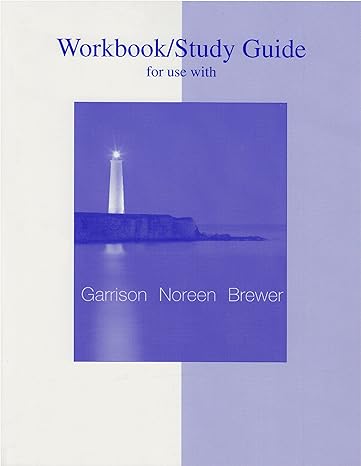Question
For each of the following independent situations relating to the audit of ICFR, indicate the reason for and the type of audit report you would
For each of the following independent situations relating to the audit of ICFR, indicate the reason for and the type of audit report you would issue. a. During the audit of Wood Pharmaceuticals, you are surprised to find several control deficiencies in the entity's internal control. You determine that there is a reasonable possibility that any one of them could result in a misstatement that is significant. Although the odds are extremely low that the deficiencies, singly or taken together, will result in a material misstatement of the entity's financial statements, the large number of problems causes you concern. Management's written assessment concludes that the entity's ICFR was effective as of the report date. b. You agreed to perform an audit for Rodriguez & Co., after the entity's year- end. Due to time constraints, your audit firm could not complete a full audit of ICFR. However, the evidence you did collect suggests that the entity has exceptionally strong ICFR. You seriously doubt that a material weakness would have been found if time had permitted a more thorough audit. Management's written assessment concludes that the entity's ICFR was effective as of the report date. c. George & Diana Company's internal audit function identified a material weakness in the entity's ICFR. The entity corrected this weakness about four months prior to the end of the annual reporting period. Management reassessed controls in the area and found them effective. After reevaluating and retesting the relevant controls, you believe the controls to have been effective for a sufficient period of time to provide adequate evidence that they were designed and operating effectively as of the end of the entity's reporting period. Management's written assessment concludes that the entity's internal control was effective as of the report date. d. Reynolds Distilleries identified what you agree is a material weakness and made an adverse assessment in its report on ICFR. The entity had not corrected the material weakness as of the end of the reporting period. e. Cindy & David Company's management identified a material weakness in the entity's ICFR during its assessment process. The entity corrected this weakness about a month prior to the end of the annual reporting period. Management reassessed controls in the area and believes they were effective as of the end of the reporting period. After reevaluating and retesting the relevant controls, you agree that the new controls are well designed, but since the controls over this particular area are applied only once at the end of each month (i. e., the controls have only operated two times since being corrected), you do not believe you have sufficient audit evidence to assess their operating effectiveness. Management's written assessment concludes that the entity's internal control was effective as of the report date. f. During the audit of ICFR for Big Al & Larry Industries, you discover several control deficiencies. You determine that there is more than a reasonable possibility that any one of them could result in a financial statement misstatement. Although you do not believe that any of the deficiencies taken individually will result in a material misstatement, you believe there is a moderately low likelihood that, taken together, the deficiencies could produce a material misstatement. Management's written assessment concludes that the entity's internal control was effective as of the report date
Step by Step Solution
There are 3 Steps involved in it
Step: 1

Get Instant Access to Expert-Tailored Solutions
See step-by-step solutions with expert insights and AI powered tools for academic success
Step: 2

Step: 3

Ace Your Homework with AI
Get the answers you need in no time with our AI-driven, step-by-step assistance
Get Started


